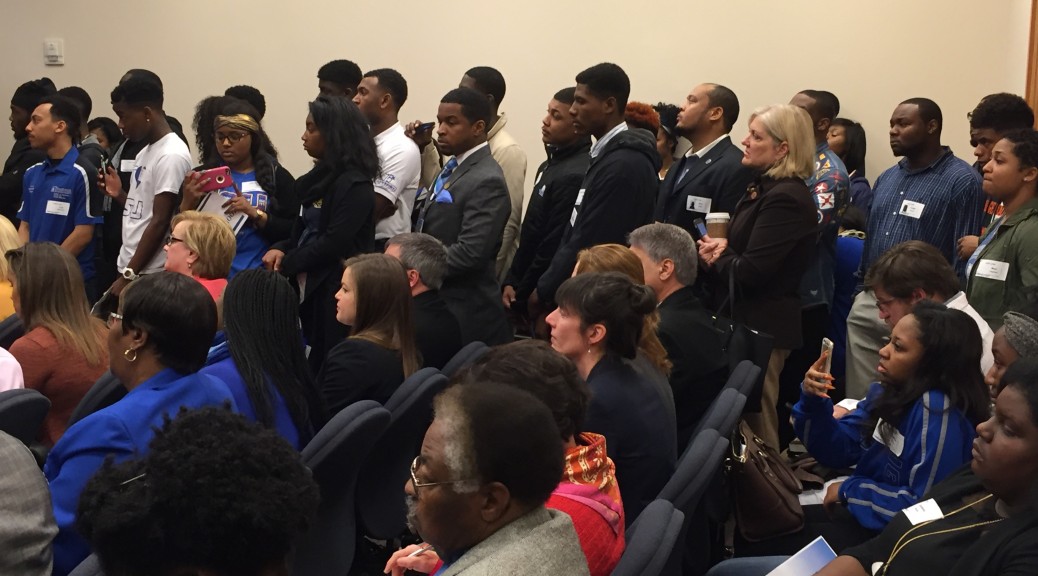NASHVILLE, Tenn. (TSU News Service) – TSU students and administrators gathered at the state Capitol and saw the Senate Education Committee delay voting on legislation that would restructure higher education governance.
The students, along with TSU President Glenda Glover, packed the hearing at the Legislative Plaza on March 2 to hear lawmakers discuss the Focus on College and University Success Act. After some lengthy debate, a vote on the legislation was delayed until next week after committee chairwoman Dolores Gresham attempted to amend the proposal to provide legislative oversight.
Committee members said they wanted more time to review the proposed amendment. TSU distributed a list of questions regarding the Act that highlighted the negative impact it would have on the institution.
The legislation, which is being pushed by Gov. Bill Haslam, had been rapidly moving through the legislative process before the delay. It’s scheduled to be taken up in the same Senate committee on March 9.
TSU student Jordan Spencer attended the Senate hearing and said she was glad to see the bill delayed.
“I’m really concerned as to the benefit it will give to our school,” said Spencer, a 20-year-old biology major. “We need specifics, and there are no projected specifics.”
Aarian Forman, a junior at TSU majoring in business administration, said he believes the strong attendance by students “made a statement to legislators.”
“We will continue to stand strong as a student body to make sure this bill is not passed, or at least in its present form,” Forman said.
The day before the Senate committee meeting, TSU students and administrators also attended the House Government Operations Committee where the FOCUS Act was also debated. Rep. Jeremy Faison, the chair of the House committee, welcomed the crowd of students and commended them for seeking more information on the legislation.
“Y’all have been extremely respectful, and I’m proud to have y’all in my committee,” said Faison, whose committee advanced the bill with a positive recommendation. He explained to students that his panel could only review the bill; not make changes or kill it.
“What I want you to know, is that regardless of the outcome of the bill, you walk out with your heads high and know that you live to fight another day,” Faison said.
Even though the FOCUS Act is likely to pass the Legislature, TSU students, faculty, and administrators contend it could be hurtful to the State’s only public HBCU.
TSU President Glenda Glover has expressed numerous concerns about the legislation. They include the possibility of the University of Tennessee, Knoxville growing even stronger because it will be left intact while the TBR is dismantled; unnecessary duplication of programs; and probably most important, maintaining an equitable funding process.
“What will the funding formula look like?” Glover said to reporters after the House committee meeting. “The legislation only broadly describes it, but no formula is in place at this point. The (Tennessee) Board of Regents ensures balance. They do all they can to make the playing field fair. “
Currently, the Board of Regents oversees 46 institutions: six public four-year state universities (including TSU), 13 community colleges and 27 technical colleges.
Under the FOCUS Act, TBR would oversee the state’s community and technical colleges only, and focus on promoting graduation rates at those institutions. Haslam has said the legislation is the next step in his “Drive to 55” initiative, which seeks to increase the percentage of Tennesseans with a postsecondary credential to 55 by 2025.
“With 46 institutions, it is difficult for TBR to meet all of the diverse challenges of the system,” according to the governor’s website about the legislation. “Community colleges arguably need greater focus at a system level in the Drive to 55, while TBR’s four-year state universities could benefit from greater autonomy.”
Despite her concerns, Glover said she’s still willing to work with the governor’s office to make the proposal less hurtful to TSU.
“We’ve been in contact with the governor’s office, and we’ve expressed concerns,” she said. “And to their credit, they’ve listened to quite a few of them. I have to be optimistic that we’ll continue to work with the governor’s office to work out the remaining differences.”
The FOCUS bill will have to pass finance committees in the House and Senate before reaching a full vote on the floors of both chambers.
According to the Tennessee General Assembly’s website, the legislation is scheduled to be heard in the House Finance, Ways and Means Subcommittee on March 9 at 10:30 a.m. It’s scheduled for 2:30 p.m. in the Senate Education Committee on the same day.
Department of Media Relations
Tennessee State University
3500 John Merritt Boulevard
Nashville, Tennessee 37209
615.963.5331
About Tennessee State University
With more than 9,000 students, Tennessee State University is Nashville’s only public university, and is a comprehensive, urban, co-educational, land-grant university offering 38 undergraduate, 22 graduate and seven doctoral programs. TSU has earned a top 20 ranking for Historically Black Colleges and Universities according to U.S. News and World Report, and rated as one of the top universities in the country by Washington Monthly for social mobility, research and community service. Founded in 1912, Tennessee State University celebrated 100 years in Nashville during 2012. Visit the University online at tnstate.edu.
